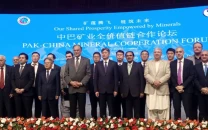No graphene for Pakistan
Research and development in graphene falls in that notorious bracket of science – nanotechnology

It is difficult to accept that such an infinitesimal substance is measured to be 200 times stronger than steel and has a record tensile strength of 1.5 million pounds per square inch. Aside from its remarkable structural properties, it is highly sensitive to light and has incredible thermal and electrical conductivity.
From being a prospective component of textiles, fuel, transistors and composite powder to revolutionising water filtration, solar power and energy storage, graphene has introduced itself as an unbeatable alternative in innumerable technological and industrial spheres. This is precisely why investors across the globe have gone “graphene-crazy”. Its expected value is predicted to rise by eighteen-fold from the current $10 million in just four years. It comes as no surprise then that the South Korean government has set aside $350 million solely for graphene funding, which is less than a third of the amount that the US government has invested already.
But where does Pakistan stand in the global graphene race?
Unfortunately, quite far behind: although many government officials, academics and private sector investors have expressed their appreciation of the rise of nanotechnological research and its many social and economic benefits, the outcome has been bleak. Case in point, in early 2013, renowned faculty members of the University of Karachi and government officials like Professor Attaur Rehman, former chairman of the Higher Education Commission, congregated to kick-start the construction of the Latif Ebrahim Jamal Nanotechnology Research Centre. Up to Rs50 million was apparently allocated for this purpose and the project was meant to be completed in a year (six months ago). After this initial fervour, there has been no sign or report of this facility. Similarly there have been various committees, commissions and initiatives drawn out by the government but they tend to exist only in archives. The Preston Institute of Science and Technology offers a bachelor’s degree in nanoscience and technology, but due to a lack of government effort and research centres in the country, there is meagre opportunity for young graduates to utilise their knowledge (and then we complain about brain drain).
Hopefully, after the current political turmoil settles down, the government will begin to focus on economic and social development which in today’s world is intrinsically linked with science and technology.
Published in The Express Tribune, August 27th, 2014.



















COMMENTS
Comments are moderated and generally will be posted if they are on-topic and not abusive.
For more information, please see our Comments FAQ